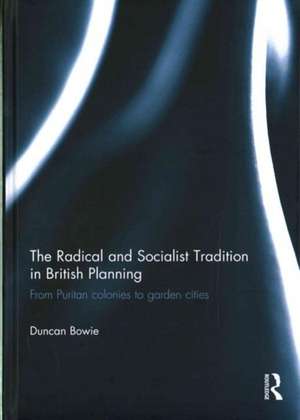The Radical and Socialist Tradition in British Planning: From Puritan colonies to garden cities
Autor Duncan Bowieen Limba Engleză Hardback – 13 iul 2016
The book, in effect, presents a prehistory of land, planning and housing reform in the UK in contrast with most historiography which focuses on the immediate pre-World War I period. Providing an analysis of different intellectual traditions and contrasting middle class-led reform initiatives with those based on working class organisations, the book seeks to relate historical debates to contemporary themes, including utopianism and pragmatism, the role of the state, the balance between local initiatives and centrally driven reforms and the interdependence of land, housing and planning.
| Toate formatele și edițiile | Preț | Express |
|---|---|---|
| Paperback (1) | 414.32 lei 43-57 zile | |
| Taylor & Francis – 8 iun 2018 | 414.32 lei 43-57 zile | |
| Hardback (1) | 849.77 lei 43-57 zile | |
| Taylor & Francis – 13 iul 2016 | 849.77 lei 43-57 zile |
Preț: 849.77 lei
Preț vechi: 1141.63 lei
-26% Nou
Puncte Express: 1275
Preț estimativ în valută:
162.61€ • 170.20$ • 135.34£
162.61€ • 170.20$ • 135.34£
Carte tipărită la comandă
Livrare economică 31 martie-14 aprilie
Preluare comenzi: 021 569.72.76
Specificații
ISBN-13: 9781472479020
ISBN-10: 1472479025
Pagini: 232
Dimensiuni: 174 x 246 x 18 mm
Greutate: 0.57 kg
Ediția:1
Editura: Taylor & Francis
Colecția Routledge
Locul publicării:Oxford, United Kingdom
ISBN-10: 1472479025
Pagini: 232
Dimensiuni: 174 x 246 x 18 mm
Greutate: 0.57 kg
Ediția:1
Editura: Taylor & Francis
Colecția Routledge
Locul publicării:Oxford, United Kingdom
Cuprins
1. Introduction: Radicalism, Socialism, Planning and Planning History, 2. Radicals and Planning in Britain and the Colonies: From the Puritans to the Restoration, 3. Enlightenment Planning, 4. The Benthamites and Utilitarian Planning, 5. Owenite Co-operation and Plans for New Communities, 6. The Influence of the French Utopian Socialists in England, 7. Working Class Radicals and the Land, 8. Social Reform and Social Science, 9. The Socialist Revival, Land and Housing Reform, 10. Visions and Politics of the Garden City Pioneers, 11. The Institutionalisation of Planning and Housing, 12. Radical and Socialist Influences on Land, Planning and Housing Reform
Notă biografică
Duncan Bowie is a senior lecturer in planning and housing at the University of Westminster, where he is course leader on the MA Urban and Regional Planning. He has worked in senior posts in housing and planning for the Mayor of London, the Housing Corporation, the London Docklands Development Corporation and London boroughs. He is a member of the policy council of the Town and Country Planning Association, as well as the executive committees of the London Labour Housing Group, the Socialist History Society and the London Society.
Recenzii
At a time when the practice of planning is so contested and the underlying principles largely forgotten in England it plays a vital role in reminding us of the social movement which framed the development of town planning. It seems to me that it provides an insightful and accessible narrative which is crucial in understanding the formative values and philosophy of town planning. It fits very closely with TCPA attempts to ignite enthusiasm amongst practitioners and students for the ambitious social purpose of planning. It should be a core part of planning students reading! It was also simply a great read, providing a vivid picture of the personalities and events that founded the movement.
Hugh Ellis, Head of Policy, TCPA
Banishing cynicism and disillusion, Duncan Bowie's itinerary through the history of utopian settlements reads as a journey not of failure, but hope.
Michael Hebbert, UCL
Bowie successfully presents a contrasting historiography of planning, which rather than focusing on a select group of philanthropists and reformers from the nineteenth century, instead draws attention to working class radicals and socialist reformers, providing both a detailed account of previous periods and alternatives to the classical accounts of the birth of planning, housing and land reform, from Ebenezer Howard, to Octavia Hill and Henry George.
Sophie Elsmore, London South Bank University, International Journal of Housing Policy
Bowie drives home that our roots are in ‘self-supporting philanthropic and co-operative initiatives’, new settlements, using the uplift in land value arising from development for investment in better places, and positively planning our towns for wider community benefits.
Lee Shostak, TCPA, Town & Country Planning, October 2016
Bowie’s style is episodic and at times disjointed but he succeeds in making the argument that town planning developed out of campaigns about the land, its use and ownership – and so suggesting that the profession should not lose sight of the radical impulse from which it arose.
Andrew Whitehead, History Journal Workshop
Yet his work retains a discernible sense of rebellion against the ‘condescension of posterity’ as he indicates how the principles and actions of radical thinkers have been an important component of housing and planning reform, and consequently the physical evolution of urban places.
Jonathan Manns, Journal of the London Society, edition 470
Hugh Ellis, Head of Policy, TCPA
Banishing cynicism and disillusion, Duncan Bowie's itinerary through the history of utopian settlements reads as a journey not of failure, but hope.
Michael Hebbert, UCL
Bowie successfully presents a contrasting historiography of planning, which rather than focusing on a select group of philanthropists and reformers from the nineteenth century, instead draws attention to working class radicals and socialist reformers, providing both a detailed account of previous periods and alternatives to the classical accounts of the birth of planning, housing and land reform, from Ebenezer Howard, to Octavia Hill and Henry George.
Sophie Elsmore, London South Bank University, International Journal of Housing Policy
Bowie drives home that our roots are in ‘self-supporting philanthropic and co-operative initiatives’, new settlements, using the uplift in land value arising from development for investment in better places, and positively planning our towns for wider community benefits.
Lee Shostak, TCPA, Town & Country Planning, October 2016
Bowie’s style is episodic and at times disjointed but he succeeds in making the argument that town planning developed out of campaigns about the land, its use and ownership – and so suggesting that the profession should not lose sight of the radical impulse from which it arose.
Andrew Whitehead, History Journal Workshop
Yet his work retains a discernible sense of rebellion against the ‘condescension of posterity’ as he indicates how the principles and actions of radical thinkers have been an important component of housing and planning reform, and consequently the physical evolution of urban places.
Jonathan Manns, Journal of the London Society, edition 470
Descriere
Focusing on the key period between the late 18th century and 1914, this book provides the first comprehensive narrative account of radical and socialist texts and organised movements for reform to land planning and housing policies in Britain.










